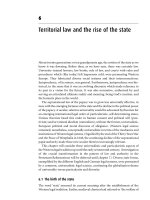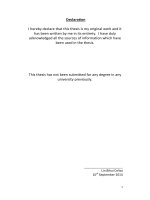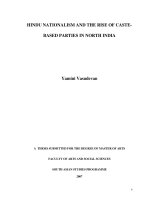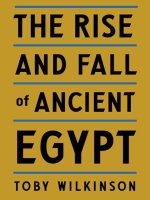Edmund morris MORRIS THEODORE ROOSEVELT 01 the rise of theodore roosevelt (v5 0)
Bạn đang xem bản rút gọn của tài liệu. Xem và tải ngay bản đầy đủ của tài liệu tại đây (8.93 MB, 715 trang )
PRAISE FOR
THE RISE OF THEODORE ROOSEVELT
“Reading Morris’s comprehensive, necessarily breathless account of Roosevelt’s rise is like riding a cannonball express through
the Rockies, the peaks whipping past, one exceeding another in magnificence.”
—MORDECAI RICHLER
“Morris has written a monumental work in every sense of the word.… The result is a book of pulsating and well-written
narrative, documented by well over 100 pages of minute, immaculate notes. An average reader will take a long time to read
and absorb it all. But read it he will. The tale never lags, like its unique human subject.”
—EDWIN TETLOW, The Christian Science Monitor
“His prose is elegant and at the same time hard and lucid, and his sense of narrative
ow is nearly awless.… The author
recreates a sense of the scene and an immediacy of the situation that any skilled writer should envy and the most jaded reader
should find a joy.”
—DARDEN A. PYRON, Miami Herald
“It is a big volume, but it is exciting enough to thrill any reader. Morris has an exceptional dexterity with words.… This book
will undoubtedly become the standard study of Roosevelt’s rise to power.”
—THOMAS CONWAY , The Boston Sunday Globe
“To his task Morris brings imposing assets.… He is scrupulous in the use of his material and notably fair-minded, … [and] he
can tell a very good story.”
—ELTING E. MORISON, The Washington Post Book World
“This highly entertaining, immensely readable book is an extraordinary portrait of a most amazing man, Theodore Roosevelt.
… Edmund Morris is scrupulously fair. He is not judgmental; he draws no sweeping conclusions. Sympathetic, amused, and
understanding, he is neither adoring nor worshipful.”
—CAREY MC WILLIAMS, Chicago Sun-Times
“Theodore Roosevelt is one of those gures who cannot be fully calibrated without the distance of history and the views of an
outsider. This towering biography is the
rst to answer both requisites.… Orchestrating his material with a certainty and
lightness of touch, Morris shuns facile psychohistory and lets Roosevelt’s life build its own edifice.”
—EDWIN WARNER, Time
“If you want a classic Teddy biography, one that hews close to the Theodore Roosevelt of patriotic legend, this entertaining
and colorful book is for you.… TR would have enjoyed this version of his life, not only because it’s exciting, particularly the
cowboy tales, but because it’s morally correct.… In no other Roosevelt biography do we get a more lively and lifelike picture
of the pre-presidential Roosevelt.”
—NICHOLAS VON HOFFMAN, Chicago Tribune
“A huge book, but one that is so full of action that the reader will have di culty putting it down.… A monumental piece of
writing … one of the most interesting biographies to appear in many a moon.”
—JAMES H. JESSE, The Nashville Banner
“The documentation is almost overwhelming and the description of both events and personalities is unusually detailed and
complete. Morris reveals the developing personality, the complex and often contradictory character, and the multiplicity of
associations of this most ubiquitous of statesmen. His political career, literary activity, life as a rancher and soldier, and
personal life are all abundantly covered. This may well become the definitive life.”
—RALPH ADAMS BROWN, Library Journal
“If a novelist were to create a character as multidimensional as Theodore Roosevelt, his credibility would be severely strained.
One cannot nish Edmund Morris’s sympathetic study of the 26th President’s early years without feeling that if TR isn’t one of
our history’s greatest men, he is surely one of the more fascinating ones.”
—RICHARD SAMUEL WEST, The Philadelphia Inquirer
“Morris has crafted a magni cent biography, carefully researched and gracefully written. He has a keen eye for just the right
quotation to enliven an incident or bring a personality to life, and his own sense of humor sparkles through.”
—ALLEN J. SHARE, Louisville Courier-Journal
“Morris faces all the problems and contradictions.… If he were less sympathetic than he is, his treatment of these aspects might
make for distortion, but as it is, it only makes for fuller understanding.
“He is also, I must not fail to restate, a magni cent writer. You can read this book with the absorption with which you
would read a great novel.… So great is Morris’s skill that the reader follows the story as breathlessly as if he did not already
know the outcome.”
—EDWARD WAGENKNECHT, Waltham-Newton News-Tribune
“Readers of this rst volume of a biography that takes Roosevelt to his rst White House term will get some of the feeling of
having received a series of doses of electric voltage.”
—HARRY STEINBERG, Newsday
“This volume leaves us on Sept. 2, 1901. President McKinley has been shot.… America would move into the 20th century with
an activist President at its helm, a man who would set the pace of a strong, involved federal government. Morris is now writing
that part of the story, and its publication is an event to anticipate eagerly.”
—MAURICE DOLBIER, Providence Sunday Journal
“This irresistible biography is a lot more than a string of dramatic anecdotes. For example, there’s the magni cent prose
picture of the disastrous Western winter of 1886–87.… Time and again, Mr. Morris seizes such relatively minor incidents and
blows them up to fill the imaginative landscape of his study.…
“What does the total picture of Roosevelt add up to? … Mr. Morris’s refusal to interpret analytically pays rich dividends. We
get to see the many contradictory sides of Theodore Roosevelt—the killer of big game and the passionate conservationist; the
indefatigable writer of historical potboilers and the scholar who produced the de nitive naval history of the War of 1812; the
sentimental family man and the tub-thumping advocate of imperialism—the list could go on forever.… For the time being, we
can count our curiosity over them among the many reasons for looking forward to the second volume of this wonderfully
absorbing biography.”
—CHRISTOPHER LEHMANN-HAUPT, The New York Times
ALSO BY EDMUND MORRIS
Dutch: A Memoir of Ronald Reagan
Theodore Rex
AUTHOR’S NOTE
This Modern Library edition of The Rise of Theodore Roosevelt does not di er substantially from the rst edition published
in 1979, although many passages have been recast. Important material deriving from recent Roosevelt scholarship has been
added to the text and the documentation throughout. The book has been redesigned to conform with Theodore Rex, and
some illustrations have been replaced. There are no major deletions.
2001 Modern Library Paperback Edition
Copyright © 1979 by Edmund Morris
All rights reserved under International and Pan-American Copyright
Conventions. Published in the United States by Modern Library, an imprint of The Random House Publishing Group, a
division of Random House, Inc., New York, and simultaneously in Canada by Random House of Canada Limited, Toronto.
MODERN LIBRARY and the TORCHBEARER Design are registered trademarks of Random House, Inc.
This work was originally published, in slightly different form, by Coward, McCann & Geoghegan in 1979.
LIBRARY OF CONGRESS CATALOGING-IN-PUBLICATION DATA
Morris, Edmund.
The rise of Theodore Roosevelt / Edmund Morris.
p. cm.
Originally published: New York : Coward, McCann & Geoghegan,
© 1979.
eISBN: 978-0-307-77782-9
1. Roosevelt, Theodore, 1858–1919. 2. Presidents—United States—Biography. 3. United States—Politics and government—
1901–1909. 4. New York (State)—Politics and government—1865–1950. I. Title.
E757 .M883 2001
973.91′1′092—dc21
[B]
2001030520
Modern Library website address: www.modernlibrary.com
v3.1
To Sylvia
CONTENTS
Cover
Other Books by This Author
Title Page
Copyright
Dedication
Prologue: New Year’s Day, 1907
PART ONE: 1858–1886
1: The Very Small Person
2: The Mind, But Not the Body
3: The Man with the Morning in His Face
4: The Swell in the Dog-Cart
5: The Political Hack
6: The Cyclone Assemblyman
7: The Fighting Cock
8: The Dude from New York
9: The Honorable Gentleman
10: The Delegate-at-Large
11: The Cowboy of the Present
12: The Four-Eyed Maverick
13: The Long Arm of the Law
14: The Next Mayor of New York
Interlude: Winter of the Blue Snow, 1886–1887
15:
16:
17:
18:
19:
20:
The
The
The
The
The
The
PART TWO: 1887–1901
Literary Feller
Silver-Plated Reform Commissioner
Dear Old Beloved Brother
Universe Spinner
Biggest Man in New York
Snake in the Grass
21: The Glorious Retreat
22: The Hot Weather Secretary
23: The Lieutenant Colonel
24: The Rough Rider
25: The Wolf Rising in the Heart
26: The Most Famous Man in America
27: The Boy Governor
28: The Man of Destiny
Epilogue: September 1901
Acknowledgments
Bibliography
Notes
Illustrations
About the Author
PROLOGUE: NEW YEAR’S DAY, 1907
AT ELEVEN O’CLOCK PRECISELY the sound of trumpets echoes within the White House, and
oats, through open windows, out into the sunny morning. A shiver of excitement
strikes the line of people waiting four abreast outside Theodore Roosevelt’s front gate,
and runs in serpentine re ex along Pennsylvania Avenue as far as Seventeenth Street,
before whipping south and dissipating itself over half a mile away. The shiver is
accompanied by a murmur: “The President’s on his way downstairs.”1
There is some shifting of feet, but no eager pushing forward. The crowd knows that
Roosevelt has hundreds of bejeweled and manicured hands to shake privately before he
grasps the coarser esh of the general public. Judging by last year’s reception, the gate
will not be unlocked until one o’clock, and even then it will take a good two hours for
everybody to pass through. Roosevelt may be the fastest handshaker in history (he
averages fty grips a minute), but he is also the most conscientious, insisting that all
citizens who are sober, washed, and free of bodily advertising be permitted to wish the
President of the United States a Happy New Year.2
On a day as perfect as this, nobody minds standing in line—with the possible
exception of those unfortunates in the blue shadow of the State, War, and Navy
Building. Already the temperature is a springlike 55 degrees. It is “Roosevelt weather,”
to use a popular phrase.3 Ladies carry bunches of sweet-smelling hyacinths. Gentlemen
refresh their thirst at dray-wagons parked against the sidewalk. A reporter, strolling up
and down the line, notices that the weather has brought out an unusual number of
children, some of whom seem determined to enter the White House on roller skates.4
“All citizens who are sober, washed, and free of bodily advertising.”
Theodore Roosevelt receives the American people on New Year’s Day. (Illustration prl.1)
More music seeps into the still air. This time it is “The Star-Spangled Banner,” played
with digni ed restraint by the Marine Band. (The President has had occasion to
complain, in previous years, of too loud a welcome as he arrives in the vestibule.) After
only one strophe, the anthem fades into silence, and another murmur runs down the
line: “He’s taking his position in the Blue Room.” Now a German march. “He’s begun to
receive the ambassadors.”5
FOR THE LAST half hour they have been rolling up in their glossy carriages—viscounts,
barons, and knights bearing the greetings of emperors and kings to a plain man in a
frock coat. A sizable crowd has gathered outside the East Gate to watch them alight
under the porte cochère. Their Excellencies teeter down, almost crippled by the weight
of full court dress. Plumed helmets wobble precariously, while silver nose-straps tweak
at their mustaches. Great bars of medals tangle with their swaying epaulets, gold braid
sti ens their trousers, and swords of honor slap against their thigh-length patent-leather
boots. O cers of the White House detail, themselves as brilliant as butter ies, hurry
across the sunny gravel to assist. Screened through the tall pickets of the White House
fence, all this awkward pageantry dissolves into an impressionistic shimmer, and the
crowd watches fascinated until the last diplomat has hobbled inside.6
Thousands of other onlookers throng Sixteenth Street and Connecticut Avenue to
watch the cavalcade of Washington society converging upon the White House. Justices
of the Supreme Court creak by in digni ed four-wheelers. Congressional couples display
themselves to the electorate in open broughams (necks crane for a glimpse of “Princess
Alice” Longworth, the President’s beautiful daughter, in apricot satin and diamonds). A
silver-helmeted military attaché steers his own electric runabout. Two energetic little
mules haul a mud-spattered bus full of Army ladies.7
Inspired by the balmy weather, many of the President’s guests arrive on foot.
Lafayette Square is crowded with elegant young men and women. Naval o cers march
ve abreast, their plumes frothing in unison. Chinese grandees drag heavy silk robes.
Grizzled veterans of the Civil War stomp along with tinkling medals, and the crowd
parts respectfully before them. The air is full of high-spirited conversation and laughter,
while the music pouring out of the White House (a continuous medley, now, of jigs and
Joplin rags) creates an irresistible holiday mood. A newspaperman is struck by the
happiness he sees everywhere, on this, “the best and fairest day President Roosevelt
ever had.”8
SUCH SUPERLATIVES in praise of the weather are mild in comparison with those being
lavished on the state of the union. “On this day of our Lord, January 1, 1907,” the
Washington Evening Star reports, “we are the richest people in the world.” The national
wealth “has been rolling up at the rate of $4.6 billion per year, $127.3 million per day,
$5.5 million per hour, $88,430 per minute, and $1,474 per second” during President
Roosevelt’s two Administrations.9 Never have American farmers harvested such
tremendous crops; railroads are groaning under the weight of unprecedented payloads;
shipyards throb with record construction; the banks are awash with a spring-tide of
money. Every one of the forty- ve states has enriched itself since the last census, and in
per capita terms Washington, D.C., is now “the Richest Spot on Earth.”10
Politically, too, it has been a year of superlatives, many of them supplied, with
characteristic immodesty, by the President himself. “No Congress in our time has done
more good work,” he fondly told the fty-ninth, having battered it into submission with
the sheer volume of his social legislation.11 He calls its rst session “the most
substantial” in his experience of public a airs. Joseph G. Cannon, the Speaker of the
House, agrees, with one reservation about the President’s methods. “Roosevelt’s all
right,” says Cannon, “but he’s got no more use for the Constitution than a tomcat has for
a marriage license.”12
“Theodore the Sudden” has been accused of having a similar contempt for
international law, ever since the afternoon in 1903 when he allowed a U.S. warship to
“monitor” the Panamanian Revolution. If he loses any sleep over his role in that
questionable coup d’état, he shows no sign. On the contrary, he glories in the fact that
America is now actually building the Panama Canal “after four centuries of
conversation”13 by other nations. A few weeks ago he visited the Canal Zone (the rst
trip abroad by a U.S. President in o ce), and the colossal excavations there moved him
to Shakespearean hyperbole. “It shall be in future enough to say of any man ‘he was
connected with digging the Panama Canal’ to confer the patent of nobility on that
man,” Roosevelt told his sweating engineers. “From time to time little men will come
along to nd fault with what you have done … they will go down the stream like
bubbles, they will vanish; but the work you have done will remain for the ages.”14
Few, indeed, are the little men who can nd fault with the President on this beautiful
New Year’s Day, but they are correspondingly shrill. Congressman James Wadsworth, a
battered opponent of Roosevelt’s Pure Food Act (which goes into e ect today), growls
that “the bloody hero of Kettle Hill” is “unreliable, a faker, and a humbug.”15 The editor
of the St. Louis Censor, who has never forgiven Roosevelt for inviting a black man to
dine in the White House, warns that he is now trying to end segregation of Orientals in
San Francisco schools. “Almost every week his Administration has been characterized by
some outrageous act of usurpation … he is the most dangerous foe to human liberty that
has ever set foot on American soil.”16 Another Southerner, by the name of Woodrow
Wilson, is tempted to agree: “He is the most dangerous man of the age.”17 Mark Twain
believes that the President is “clearly insane … and insanest upon war and its supreme
glories.”18
Roosevelt is used to such criticism. He has been hearing it all his life. “If a man has a
very decided character, has a strongly accentuated career, it is normally the case of
course that he makes ardent friends and bitter enemies.”19 Yet even impartial observers
will admit there is a grain of truth in Twain’s assertions. The President certainly has an
irrational love of battle. He ceaselessly praises the joys of righteous killing, most
recently in his annual message to Congress: “A just war is in the long run far better for a
man’s soul than the most prosperous peace.”
Yet the fact about this most pugnacious of Presidents is that his two terms in o ce
have been almost completely tranquil. (If he had not inherited an insurrection in the
Philippines from William McKinley, he could absolve himself of any military deaths.) He
is currently being hailed around the world as a awless diplomat, and the man who has
done more to advance the cause of peace than any other. If all Eastern Asia—and for
that matter most of Western Europe—is not embroiled in con ict, it is largely due to
peace settlements delicately mediated by Theodore Roosevelt. At the same time he has
managed, without so much as ring one American pistol, to elevate his country to the
giddy heights of world power.20
He never tires of reminding people that his famous aphorism “Speak Softly and Carry
a Big Stick” proceeds according to civilized priorities. Persuasion should come before
force. In any case it is the availability of raw power, not the use of it, that makes for
e ective diplomacy. Last summer’s rebellion in Cuba, which left the island leaderless,
provided Roosevelt with a textbook example. Acting as usual with lightning swiftness,
he invoked an almost forgotten security agreement and proclaimed a U.S.-backed
provisional government within twenty-four hours of the collapse of the old. While
Secretary of War William H. Taft worked “to restore order and peace and public
con dence,” American warships steamed thoughtfully up and down the Cuban coastline.
The rebels disbanded, Taft returned to Washington, and the big white ships followed.
Cuba is now assured of regaining her independence, and the Big Stick has been laid
down unbloodied.21
Roosevelt hopes the episode will put to an end, once and for all, rumors that he is still
at heart an expansionist. “I have about as much desire to annex more islands,” he
declares, “as a boa-constrictor has to swallow a porcupine wrong end to.”22
TWO OR THREE political clouds, perhaps, mar the perfect blue of Theodore Roosevelt’s New
Year. Japan is not convinced that his efforts to end discrimination against her citizens in
California are sincere, and there are veiled threats of war; “but,” as yesterday’s
Washington Star noted con dently, “President Roosevelt thinks he can settle them.” The
stock market, despite the booming economy, seems paralyzed. Wall Street billionaires
are predicting that Roosevelt-style railroad rate regulation will sooner or later bring
about nancial catastrophe. And there is an ominous paucity of blacks on line today—
only fourteen, by one count—indicating that race resentment is growing against his
dishonorable discharge of three companies of colored soldiers for an unproved riot in
Brownsville, Texas.23
As yet, these clouds do not loom very large. Roosevelt is free to enjoy the sensation of
near-total control over “the mightiest republic on which the sun ever shone,”—his own
phrase, much repeated.24 Youngest and most vigorous man ever to enter the White
House, he exults in what today’s New York Tribune calls “an opulent e ciency of mind
and body.” He loves power, loves publicity for the added power it brings, and so far at
least seems to have disproved the Actonian theory of corruption. Curiously, the more
power Roosevelt acquires, the calmer and sweeter he becomes, and the more willing to
step down in two years’ time, although a third term is his for the asking. Until then he
intends to exercise to the full his constitutional rights to cleave continents, place
struggling poets on the federal payroll, and treat with crowned heads on terms of
complete equality. Henry Adams calls him “the best herder of Emperors since
Napoleon.”25 Expert opinion rates his in uence over Congress as greater than that of
Kaiser Wilhelm II over the Reichstag.26 He commands a twenty-four-seat majority in the
Senate, a hundred-seat majority in the House, and the frank adoration of the American
public. A cornucopia of gifts pours daily into the White House mail-room: hams shaped
to match the Rooseveltian pro le, crates of live coons, Indian skin paintings, snakes
from a traveling sideshow, chairs, badges, vases, and enough Big Sticks to dam the
Potomac. One million “Teddy” bears are on sale in New York department stores.
Countless small boys, including a frail youngster named Gene Tunney, are doing chest
exercises in the hope of emulating their hero’s physique. David Robinson, a bootblack
from Lackawanna County, Pennsylvania, has just arrived in Washington, bearing letters
of recommendation from judges and members of Congress, and begs the privilege of
shining the President’s shoes for nothing.27
Nor is Roosevelt-worship con ned to the United States. In England, King Edward VII
and ex-Prime Minister Balfour consider him to be “the greatest moral force of the age.”28
Serious British journals rank him on the same level as Washington and Lincoln. Even the
august London Times, in a review of his latest “very remarkable” message to Congress,
admits “It is hard not to covet such a force in public life as our American cousins have
got in Mr. ROOSEVELT.”29
All over the world Jews revere him for his e orts to halt the persecution of their coreligionists in Russia and Rumania, and for making Oscar Solomon Straus Secretary of
Commerce and Labor, the rst Jewish Cabinet o cer in American history. 30 France’s
Ambassador to the United States, Jules Jusserand, says publicly that “President
Roosevelt is the greatest man in the Western Hemisphere—head and shoulders above
everyone else.”31
And from Christiania, Norway, comes the ultimate accolade: an announcement that
Theodore Roosevelt, world peacemaker, has become the rst American to win the Nobel
Prize.32
TWELVE-THIRTY HAS COME and gone, but the White House gates are still rmly shut. He must
have shaken at least a thousand hands already.… Fob watches ash in the sun as
students of Washington protocol calculate how long it will take him to work his way
down through the social strata. Twenty minutes are generally enough for all the
ambassadors, ministers, secretaries, and chargés d’a aires, assuming that each atters
the President for no longer than thirty seconds; ten minutes for the Supreme Court
Justices and other members of the judiciary; a quarter of an hour for Senators,
Representatives, and Delegates in Congress (he’ll probably spend a minute or two
talking to old Chaplain Edward Everett Hale, who hasn’t missed a reception in sixty-two
years); a good half-hour, knowing Roosevelt’s priorities, for o cers of the Navy and
Army; then five minutes apiece for the Smithsonian Institution, the Civil Service, and the
Attorney General’s o ce … which means the Grand Army of the Republic should be
going through about now. Last in the order of o cial precedence will be veterans of the
Spanish-American War, including the inevitable Rough Riders, some of whom are very
rough indeed. One of today’s newspapers complains about the President’s habit of
inviting “thugs and assassins of Idaho and Montana to be his guests in the White
House.”33 But Roosevelt has never been able to turn away the friends of his youth. After
assuming the Presidency he sent out word that “the cowboy bunch can come in
whenever they want to.” When a doorkeeper mistakenly refused admission to one
leathery customer, the President was indignant. “The next time they don’t let you in,
Sylvane, you just shoot through the windows.”34
Twelve fty- ve. A stir at the head of the line. Bonnets are adjusted, with much
bobbing of arti cial fruit; ties are straightened, vests brushed free of popcorn. The gates
swing open, and two bowler-hatted policemen lead the way down the White House
drive. As the crowd approaches the portico, nine-year-old Quentin Roosevelt waves an
affable greeting from his upstairs window. The officers eye him sternly: Young “Q” has a
habit of dropping projectiles on men in uniform, including one gigantic, cop- attening
snowball that narrowly missed his father.35
The music grows louder as the public steps into the brilliantly lit vestibule. Sixty
scarlet-coated bandsmen, hedged around with holly and poinsettia, maintain a brisk,
incessant rhythm: Roosevelt knows that this makes his callers unconsciously move
faster. Ushers jerk white-gloved thumbs in the direction of the Red Room. “Step lively
now!”36
Shu ing obediently through shining pillars, past stone urns banked with Christmasowering plants, the crowd has a chance to admire Mrs. Roosevelt’s interior
restorations, begun in 1902 and only recently completed.37 (One of her husband’s rst
acts, as President, had been to ask Congress to purge the Executive Mansion of Victorian
bric-a-brac and restore it to its original “stately simplicity.”) These changes come as a
shock to older people in line who remember the cozy, shabby, half-house, half–o ce
building of yesteryear, with its dropsical sofas and brass spittoons. Now all is
spaciousness and austerity. Regal red furnishings accentuate the gleaming coldness of
stone halls and stairways. Roman bronze torches glow with newfangled electric light.
The traditional oral displays, which used to make nineteenth-century receptions look
like horticultural exhibitions, have been drastically reduced. Rare palms tower in wall
niches; vases of violets and American Beauty roses perfume the air.38
Here the Roosevelts live in a style which, to their critics, seems “almost more than
royal dignity.”39 Formality unknown since the days of George Washington governs the
conduct of the First Family. Even the President’s sisters have to make appointments to
see him. During the o cial diplomatic season, beginning today, the White House will be
the scene of banquets and receptions of an almost European splendor. (The President
spends his entire $50,000 salary on entertaining.)40 Roosevelt’s practice, on such
occasions, of making dramatic entrances at the stroke of the appointed hour, o ering
his arm to the lady who will sit at his right, looks like imperial pomp to some. “The
President,” says Henry James, “is distinctly tending—or trying—to make a court.”41
Roosevelt himself sco s cheerfully at such gibes. “They even say I want to be a prince
myself! Not I! I’ve seen too many of them!”42 He is merely performing, with meticulous
correctness, the duties of a head of state. Within the con nes of protocol he remains the
most democratic of men. He refuses to use obsequious forms of address when writing to
foreign rulers, preferring the informal second person, as a gentleman among gentlemen.
Nor is he impressed when they address him as “Your Excellency” in return. “They might
just as well call me His Transparency for all I care.”43
Yet some citizens are bent on killing this “ rst of American Caesars.” Last year a man
walked into the President’s o ce with a needle-sharp blade up his sleeve. Ever since
then, White House security has been tight.44 Uniformed aides con scate bundles, inspect
hats, draw pocketed hands into open view. All along the corridor, Secret Service men
stand like statues. Only their eyes icker: by the time a caller reaches the Blue Room, he
has been scrutinized from head to foot at least three times. Roosevelt does not want to
leave office a day too soon.
“I enjoy being President,” he says simply.45
NO CHIEF EXECUTIVE has ever had so much fun. One of Roosevelt’s favorite expressions is
“dee-lighted”—he uses it so often, and with such grinning emphasis, that nobody doubts
his sincerity. He indeed delights in every aspect of his job: in plowing through
mountains of state documents, memorizing whole chunks and leaving his desk bare of
even a card by lunchtime; in matching wits with the historians, zoologists, inventors,
linguists, explorers, sociologists, actors, and statesmen who daily crowd his table; in
bombarding Congress with book-length messages (his latest, a report on his trip to
Panama, uses the novel technique of illustrated presentation); in setting aside millions
of acres of unspoiled land at the stroke of a pen; in appointing struggling literati to jobs
in the U.S. Treasury, on the tacit understanding they are to stay away from the o ce; in
being, as one of his children humorously put it, “the bride at every wedding, and the
corpse at every funeral.”46
He takes an almost mechanistic delight in the smooth workings of political power. “It
is ne to feel one’s hand guiding great machinery.”47 Ex-President Grover Cleveland,
himself a man of legendary ability, calls Theodore Roosevelt “the most perfectly
equipped and most effective politician thus far seen in the Presidency.”48 Coming from a
Democrat and longtime Roosevelt-watcher, this praise shows admiration of one virtuoso
for another.
With his clicking e ciency and inhuman energy, the President seems not unlike a
piece of engineering himself. Many observers are reminded of a high-speed locomotive.
“I never knew a man with such a head of steam on,” says William Sturgis Bigelow. “He
never stops running, even while he stokes and res,” another acquaintance marvels,
adding that Roosevelt presents “a dazzling, even appalling, spectacle of a human engine
driven at full speed—the signals all properly set beforehand (and if they aren’t, never
mind!).” Henry James describes the engine as “destined to be overstrained perhaps, but
not as yet, truly, betraying the least creak … it functions astonishingly, and is quite
exciting to see.”49
At the moment, Roosevelt can only be heard, since the rst wave of handshakers,
ling through the Red Room into the Blue, obscures him from view. He is in particularly
good humor today, laughing heartily and often, in a high, hoarse voice that oats over
the sound of the band.50 It is an irresistible laugh: an eruption of mirth, rising gradually
to falsetto chuckles, that convulses everybody around him. “You don’t smile with Mr.
Roosevelt,” writes one reporter, “you shout with laughter with him, and then you shout
again while he tries to cork up more laugh, and sputters, ‘Come, gentlemen, let us be
serious. This is most unbecoming.’ ”51
Besides being receptive to humor, the President produces plenty of it himself. As a
raconteur, especially when telling stories of his days among the cowboys, he is
inimitable, making his audiences laugh until they cry and ache. “You couldn’t pick a
hallful,” declares the cartoonist Homer Davenport, “that could sit with faces straight
through his story of the blue roan cow.”52 Physically, too, he is funny—never more so
than when indulging his passion for eccentric exercise. Senator Henry Cabot Lodge has
been heard yelling irritably at a portly object swaying in the sky, “Theodore! if you
knew how ridiculous you look on top of that tree, you would come down at once.”53 On
winter evenings in Rock Creek Park, strollers may observe the President of the United
States wading pale and naked into the ice-clogged stream, followed by shivering
members of his Cabinet.54 Thumping noises in the White House library indicate that
Roosevelt is being thrown around the room by a Japanese wrestler; a particularly
seismic crash, which makes the entire mansion tremble, signi es that Secretary Taft has
been forced to join in the fun.55
Mark Twain is not alone in thinking the President insane. Tales of Roosevelt’s
unpredictable behavior are legion, although there is usually an explanation. Once, for
instance, he hailed a hansom cab on Pennsylvania Avenue, seized the horse, and mimed
a knife attack upon it. On another occasion he startled the occupants of a trolley-car by
making hideous faces at them from the Presidential carriage. It transpires that in the
former case he was demonstrating to a companion the correct way to stab a wolf; in the
latter he was merely returning the grimaces of some small boys, one of whom was the
ubiquitous Quentin.56
Roosevelt can never resist children. Even now, he is holding up the line as he rumples
the hair of a small boy with skates and a red sweater. “You must always remember,”
says his English friend Cecil Spring Rice, “that the President is about six.”57 Mrs.
Roosevelt has let it be known that she considers him one of her own brood, to be
disciplined accordingly. Between meetings he loves to sneak upstairs to the attic,
headquarters of Quentin’s “White House Gang,” and thunder up and down in pursuit of
squealing boys. These romps leave him so disheveled he has to change his shirt before
returning to his duties.58
A very elegant old lady moves through the door of the Blue Room and curtsies before
the President. He responds with a deep bow whose grace impresses observers.59
Americans tend to forget that Roosevelt comes from the rst circle of the New York
aristocracy; the manners of Gramercy Park, Harvard, and the great houses of Europe
ow naturally out of him. During the Portsmouth Peace Conference in 1905, he handled
Russian counts and Japanese barons with such delicacy that neither side was able to
claim preference. “The man who had been represented to us as impetuous to the point
of rudeness,” wrote one participant, “displayed a gentleness, a kindness, and a
tactfulness that only a truly great man can command.”60
Roosevelt’s courtesy is not extended only to the well-born. The President of the United
States leaps automatically from his chair when any woman enters the room, even if she
is the governess of his children. Introduced to a party of people who ignore their own
chau eur, he protests: “I have not met this gentleman.” He has never been able to get
used to the fact that White House stewards serve him ahead of the ladies at his table, but
accepts it as necessary protocol.61
For all his o -duty clowning, Roosevelt believes in the dignity of the Presidency. As
head of state, he considers himself the equal, and on occasion the superior, of the
scepter-bearers of Europe. “No person living,” he curtly informed the German
Ambassador, “precedes the President of the United States in the White House.” He is
quick to freeze anybody who presumes to be too familiar. Although he is resigned to
being popularly known as “Teddy,” it is a mistake to call him that to his face. He
regards it as an “outrageous impertinence.”62
CORDS OF OLD GOLD velvet channel the crowd into single le at the entrance to the Blue
Room. Since the President stands just inside the door, on the right, there is little time to
admire the oval chamber, with its silk-hung walls and banks of white roses; nor the
beauty of the women invited “behind the line”—a signal mark of Presidential favor—
and who now form a rustling backdrop of chi on and lace and satin, their pearls aglow
in the light of three sunny windows.63 Roosevelt is shaking hands at top speed, so the
observer has only two or three seconds to size him up.
A FEW SECONDS, surprisingly, are enough. Theodore Roosevelt is a man of such
overwhelming physical impact that he stamps himself immediately on the consciousness.
“Do you know the two most wonderful things I have seen in your country?” says the
English statesman John Morley. “Niagara Falls and the President of the United States,
both great wonders of nature!”64 Their common quality, which photographs and
paintings fail to capture, is a perpetual ow of torrential energy, a sense of motion
even in stillness.65 Both are physically thrilling to be near.
Although Theodore Roosevelt stands three inches short of six feet, he seems palpably
massive.66 Two hundred pounds of muscle—those who think it fat have not yet been
bruised by contact with it—thicken his small-boned frame. (The only indications of the
latter are tapered hands and absurdly small shoes.) A walrus-like belt of muscle strains
against his sti collar. Muscles push through the sleeves of his gray frock coat and the
thighs of his striped trousers. Most muscular of all, however, is the famous chest, which
small boys, on less formal occasions, are invited to pummel. Members of the White
House Gang admit to “queer sensations” at the sight of this great barrel bearing down
upon them, and half expect it to burst out of the Presidential shirt. Roosevelt has spent
many thousands of hours punishing a variety of steel springs and gymnastic equipment,
yet his is not the decorative brawn of a mere bodybuilder. Professional boxers testify
that the President is a born ghter who repays their more ferocious blows with interest.
“Theodore Roosevelt,” says his heavyweight sparring partner, “is a strong, tough man;
hard to hurt and harder to stop.”67
The nerves that link all this mass of muscle are abnormally active. Roosevelt is not a
twitcher—in moments of repose he is almost cataleptically still—but when talking his
entire body mimes the rapidity of his thoughts. The right hand shoots out, bunches into a
st, and smacks into the left palm; the heels click together, the neck bulls forward, then,
in a spasm of amusement, his face contorts, his head tosses back, spectacle-ribbons
ying, and he shakes from head to foot with laughter. A moment later, he is listening
with passionate concentration, crouching forward and massaging the speaker’s shoulder
as if to wring more information out of him. Should he hear something not to his liking,
he recoils as if stung, and the blood rushes to his face.68
Were it not for his high brow, and the distracting brilliance of his smile, Roosevelt
would unquestionably be an ugly man. His head is too big and square (one learned
commentator calls it brachycephalous),69 his ears too small, his jowls too heavy. The
sti brown hair is parted high and clipped un atteringly short. Rimless pince-nez
squeeze the thick nose, etching a tiny, perpetual frown between his eyebrows. The eyes
themselves are large, wide-spaced, and very pale blue. Although Roosevelt’s gaze is
steady, the constant movement of his head keeps slicing the pince-nez across it, in a
series of twinkling eclipses that make his true expression very hard to gauge. Only those
who know him well are quick enough to catch the subtler messages Roosevelt sends
forth. William Allen White occasionally sees “the shadow of some inner femininity
deeply suppressed.”70 Owen Wister has detected (and Adolfo Muller-Ury painted) a sort
of blurry wistfulness, a mixture of “perplexity and pain … the sign of frequent con ict
between what he knew, and his wish not to know it, his determination to grasp his
optimism tight, lest it escape him.”71
His ample mustache does not entirely conceal a large, pouting underlip, on the rare
occasions when that lip is still. Mostly, however, the mustache gyrates about Roosevelt’s
most celebrated feature—his dazzling teeth. Virtually every published description of the
President, including those of provincial reporters who can catch only a quick glimpse of
him through the window of a campaign train, celebrates his dental display. Cartoonists
across the land have sketched them into American folk-consciousness, so much so that
envelopes ornamented only with teeth and spectacles are routinely delivered to the
White House.72
At rst sight the famous incisors are, perhaps, disappointing, being neither so big nor
so prominent as the cartoonists would make out. But to watch Roosevelt talking is to be
hypnotized by them. White and even, they chop every word into neat syllables, sending
them forth perfectly formed but separate, in a jerky staccatissimo that has no relation to
the normal rhythms of speech. The President’s diction is indeed so syncopated, and
accompanied by such surprise thrusts of the head, that there are rumors of a youthful
impediment, successfully conquered.73 His very voice seems to rasp out of the tips of his
teeth. “I always think of a man biting tenpenny nails when I think of Roosevelt making
a speech,” says an old colleague.74 Others are reminded of engines and light artillery.
Sibilants hiss out like escaping steam; plosives drive the lips apart with an audible pfft.75
Hearing him close up, one can understand his constant use of “dee-lighted.”
Phonetically, the word is made for him, with its grinning vowels and snapped-o
consonants. So, too, is that other staple of the Rooseveltian vocabulary, “I.” He
pronounces it “Aieeeee,” allowing the nal e’s to rise to a self-satis ed pitch which
never fails to irritate Henry Adams.76
The force of Roosevelt’s utterance has the e ect of burying his remarks, like shrapnel,
in the memory of the listener. Years after meeting him, an Ohio farmer will lovingly
recall every in ection of some such banality as “Are you German? Congratulations—I’m
German too!” (His ability to nd common strains of ancestry with voters has earned him
the nickname of “Old Fifty-seven Varieties.”)77 Children are struck by the tenderness
with which he enunciates his wife’s name—“Edith.”78 H. G. Wells preserves, as if lmed
and recorded, an interview with the President in the White House garden last summer.
“I can see him now, and hear his unmusical voice saying, ‘the e ort’s worth it, the
e ort’s worth it,’ and see the … how can I describe it? The friendly peering snarl of his
face, like a man with sun in his eyes.”79
The British author declares, in a Harper’s Weekly article, that Roosevelt is as impressive
mentally as physically. “His range of reading is amazing. He seems to be echoing with
all the thought of the time, he has receptivity to the pitch of genius.”80 Opinions are
divided as to whether the President possesses the other aspect of genius, originality. His
habit of inviting every eminent man within reach to his table, then plunging into the
depths of that man’s specialty (for Roosevelt has no small talk), exposes but one facet of
his mind at a time, to the distress of some nely tuned intellects. The medievalist Adams
nds his lectures on history childlike and super cial; painters and musicians sense that
his artistic judgment is coarse.81
Yet the vast majority of his interlocutors would agree with Wells that Theodore
Roosevelt has “the most vigorous brain in a conspicuously responsible position in all the
world.”82 Its variety is protean. A few weeks ago, when the British Embassy’s new
councillor, Sir Esmé Howard, mentioned a spell of diplomatic duty in Crete, Roosevelt
immediately and learnedly began to discuss the archeological digs at Knossos. He then
asked if Howard was by any chance descended from “Belted Will” of Border fame—
quoting Scott on the subject, to the councillor’s mysti cation.83 The President is also
capable of declaiming German poetry to Lutheran preachers, and comparing recently
resuscitated Gaelic letters with Hopi Indian lyrics. He is recognized as the world
authority on big American game mammals, and is an ornithologist of some note.
Stooping to pick a speck of brown fluff off the White House lawn, he will murmur, “Very
early for a fox sparrow!”84 Roosevelt is equally at home with experts in naval strategy,
forestry, Greek drama, cowpunching, metaphysics, protective coloration, and football
techniques. His good friend Mrs. Henry Cabot Lodge cherishes the following Presidential
document, dated 11 March 1906:
Dear Nannie Can you have me to dinner either Wednesday or Friday? Would you be willing to have Bay and Bessie
also? Then we could discuss the Hittite empire, the Pithecanthropus, and Magyar love songs, and the exact relations of
the Atli of the Volsunga Saga to the Etzel of the Nibelungenlied, and of both to Attila—with interludes by Cabot about
the rate bill, Beveridge, and other matters of more vivid contemporary interest. Ever yours,
THEODORE ROOSEVELT85
There is self-mockery in this letter, but nobody doubts that Roosevelt could (and
probably did) hold forth on such subjects in a single evening. He delights like a
schoolboy in parading his knowledge, and does so so loudly, and at such length, that
less vigorous talkers lapse into weary silence. John Hay once calculated that in a twohour dinner at the White House, Roosevelt’s guests were responsible for only four and a
half minutes of conversation; the rest was supplied by the President himself.86
He is, fortunately, a superb talker, with a gift for le mot juste that stings and sizzles.
Although he hardly ever swears—his intolerance of bad language verges on the prissy—
he can pack such venom into a word like “swine” that it has the force of an obscenity,
making his victim feel more swinish than a styful of hogs.87 Roosevelt has a particular
gift for humorous invective. Old-timers still talk about the New York Supreme Court
Justice he pilloried as “an amiable old fuzzy-wuzzy with sweetbread brains.” Critics of
the Administration’s Panama policy are “a small bunch of shrill eunuchs”; demonstrators
against bloodsports are “logical vegetarians of the abbiest Hindoo type.” President
Castro of Venezuela is “an unspeakably villainous little monkey,” President Marroquín
of Colombia is a “pithecanthropoid,” and Senator William Alfred Pe er is immortalized
as “a well-meaning, pin-headed, anarchistic crank, of hirsute and slabsided aspect.”88
When delivering himself of such insults, the President grimaces with glee. Booth
Tarkington detects “an undertone of Homeric chuckling.”89
Theodore Roosevelt is now only one handshake away. His famous “presence” charges
the air about him. It is, in the opinion of one veteran politician, “unquestionably the
greatest gift of personal magnetism ever possessed by an American.”90 Other writers
grope for metaphors ranging from e ervescence to electricity. “One despairs,” says
William Bayard Hale, “of giving a conception of the constancy and force of the stream
of corpuscular personality given o by the President … It begins to play on the visitor’s
mind, his body, to accelerate his blood-current, and set his nerves tingling and his skin
aglow.”91
The word “tingle” appears again and again in descriptions of encounters with
Roosevelt. He has, as Secretary Straus observes, “the quality of vitalizing things,”92 and
some people take an almost sensual pleasure in his proximity. Today, the President
radiates even more health and vigor than usual—he has spent the last ve days
pounding through wet Virginia forests in search of turkey. His sti hair shines, his
complexion is a ruddy brown, his body exudes a clean scent of cologne.93
He stands with tiny feet spraddled, shoulders thrown back, chest and stomach crescent
as a peacock, his left thumb comfortably hooked into a vest pocket. For what must be
the three thousandth time, his right arm shoots out. “Dee-lighted!” Unlike his
predecessors, Theodore Roosevelt does not limply allow himself to be shaken. He seizes
on the ngers of every guest, and wrings them with surprising power. “It’s a very full
and very rm grip,” warns one newspaper, “that might bring a woman to her knees if
she wore her rings on her right hand.”94 The grip is accompanied by a discreet, but
irresistible sideways pull, for the President, when he lets go, wishes to have his guest
already well out of the way.95 Yet this lightning moment of contact is enough for him to
transmit the full voltage of his charm.
Insofar as charm can be analyzed, Roosevelt’s owes its potency to a combination of
genuine warmth and the self-con dence of a man who, in all his forty-eight years, has
never encountered a character stronger than his own—with the exception of one revered
person, with the same name as himself.
Women nd the President enchanting. “I do delight in him,” says Edith Wharton. The
memory of every Rooseveltian encounter glows within her “like a tiny morsel of
radium.”96 Another woman writes of meeting him at a reception: “The world seemed
blotted out. I seemed to be enveloped in an atmosphere of warmth and kindly
consideration. I felt that, for the time being, I was the sole object of his interest and
concern.”97 If he senses any sexual interest in him, Theodore Roosevelt shows no sign: in
matters of morality he is as prudish as a dowager. That small hard hand has caressed
only two women. One of them stands beside him now, and the other, long dead, is never
mentioned.
Men, too, feel the power of his charm. Even the bitterest of his political enemies will
allow that he is “as sweet a man as ever scuttled a ship or cut a throat.”98 Senator John
Spooner stormed into his o ce the other day “angry as a hornet” over Brownsville, and
emerged “liking him again in spite of myself.” Henry James, who privately considers
Roosevelt to be “a dangerous and ominous jingo,” is forced to recognize “his amusing
likeability.”99
His friends are frank in their adoration. “Theodore is one of the most lovable as well
as one of the cleverest and most daring men I have ever known,” says Henry Cabot
Lodge, not normally given to hyperbole. Crusty John Muir “fairly fell in love” with the
President when he visited Yosemite, and Jacob Riis claims the years he spent with
Roosevelt were the happiest of his life.100
Yet, for all the warmth of the handshake, and the squeaking sincerity of the “Deelighted!” there is something automatic about that gray-blue gaze. One almost hears the
whir of a shutter. “While talking,” notes the Philadelphia Independent, “the camera of his
mind is busy taking photographs.”101 If Roosevelt senses the presence of somebody who
is likely to be of use to him, either politically or socially, he will instantly le the
photograph, and with half a dozen sentences ensure that his guest, in turn, never forgets
him. Ten years later is not too long a time for Roosevelt to call upon that man, in the
sure knowledge that he has a friend.102
Theodore Roosevelt’s memory can, in the opinion of the historian George Otto
Trevelyan, be compared with the legendary mechanism of Thomas Babington
Macaulay.103 Authors are embarrassed, during Presidential audiences, to hear long
quotes from their works which they themselves have forgotten. Congressmen know that
it is useless to contest him on facts and gures. He astonishes the diplomat Count Albert
Apponyi by reciting, almost verbatim, a long piece of Hungarian historical literature:
when the Count expresses surprise, Roosevelt says he has neither seen nor thought of the
document in twenty years. Asked to explain a similar performance before a delegation
of Chinese, Roosevelt explains mildly: “I remembered a book that I had read some time
ago, and as I talked the pages of the book came before my eyes.”104 The pages of his
speeches similarly swim before him, although he seems to be speaking impromptu.
When confronted with a face he does not instantly recall, he will put a hand over his









